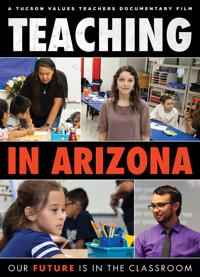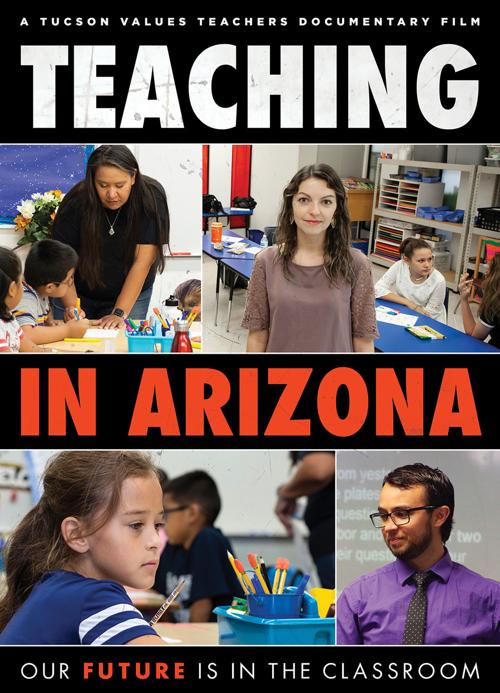It’s been 10 years since the Southern Arizona Leadership Council and education leaders launched Tucson Values Teachers, and the local nonprofit has two goals as it marks the anniversary: Stage a celebration and start a conversation about education.
They plan to accomplish both through Let’s Talk Ed at 5 p.m. Sept. 20 at the Tucson Convention Center, 260 S. Church Ave.
“We recognize the critical impact that teachers have on student achievement, and we are the only organization in the state to focus solely on the teacher work force,” said Colleen Niccum, chief executive officer of the group.
Niccum emphasized that over the past decade, more than 10,000 teachers have benefited from programs and initiatives provided by Tucson Values Teachers. Programs include Tucson Supplies Teachers, which raises funds for gift cards with which teachers can purchase school supplies; a Teacher Discount Card that provides discounts and special offers to more than 90 local businesses; Teachers in Industry, a business-education partnership that places teachers in the workforce during the summer; and Teacher Excellence Awards to spotlight outstanding educators.
“We are really proud of the fact that these programs have generated investments of nearly $8 million from businesses, foundations and supporters, but we still have lots of work to do to fully fund the Arizona education system so that we can attract high quality teachers in every K through 12 classroom and make sure all students have access to high quality education,” Niccum said.
Niccum said the group has also been instrumental in elevating awareness about Arizona’s teaching crisis. She believes that educating the public and sparking discussions about teacher work-force issues will further improve upon the gains made when teachers received a significant financial commitment from the Legislature in May to raise teacher pay and provide additional funds for Arizona classrooms.
As a cornerstone of that awareness effort, the group has produced a short film documentary, “Teaching in Arizona,” which follows three Tucson educators to deliver an intimate portrait about the challenges and rewards facing teachers.
“We want to put a personal face on data about teacher career satisfaction and give people an inside look at what it is like to be a teacher today in Arizona,” Niccum said. “Some people feel like it is not a full-time job — they think that you have summers off, and that is often not true. A lot has changed for teachers over the past several decades.”
Director Lisa Molomot said the experience was enlightening.
“We spent time with the teachers not only in the classroom, but in their home lives outside of work, where the realities of teaching were perhaps slightly different for each of them given their family situations. It was really an eye-opening picture of how involved teaching is, what a full-time job it is and how dedicated these teachers are,” said Molomot, an adjunct instructor at the University of Arizona College of Fine Arts in the School of Theatre, Film and Television.
Nate Rios, 36, one of the teachers featured in “Teaching in Arizona,” can attest to that.
“We invest 60 hours weekly during the nine to 12 months that we teach because we love kids. If you ask any teacher why they teach, they will say it is for the kids,” Rios said. “There is a duty that exists in our lives that goes beyond money. A paycheck is important, but we want to make a difference in society,” said Rios, a UA graduate who teaches government and advanced placement U.S. history at Flowing Wells High School.
His wife, Tori, teaches math at the school, and the couple have three young children, but Rios’ days often don’t end with parental and school obligations. He works at Screamery Ice Cream Friday nights and one Saturday a month.
“For us to both be teachers and have three kids and a home that is our own — to have the American dream in place — requires one of us to have a second job” said Rios. “Teaching is a great job and it pays fine, but as our family has increased in size over the past 10 years and we moved into our own place and our responsibilities increased, our wages have not necessarily grown so we have had to adjust. Working another job is part of the adjustment that exists in our lives.” said Rios.
Rios said the pressure from all of the responsibilities can be hard to handle.
“We have to balance between the classroom, which is all-consuming, and our kids, which are all-consuming and try to maintain our marriage. We bring home the weight of 105 kids’ worlds and still have to ante up for our primary responsibility, which is our family — oftentimes that is overlooked when discussing the life of a teacher,” Rios said.
Tia Tsosie-Begay, another educator profiled in the documentary, offers further insight .
Tsosie-Begay, 38, teaches fourth grade at Los Niños Elementary School in the Sunnyside Unified School District. She grew up on the Navajo Nation in Northern Arizona and attended the UA, where she received a bachelor’s degree in elementary education with an emphasis in science.
“What motivates me as an educator is that my teaching has an impact on students who are the future voters, the politicians, the scientists, the health professionals, the people who will take care of us,” she said “They will be our librarians, our tech support and our leaders. That is who I am working with right now. To be able to say we did our best and gave our best to the future is profound.”





